|
|
|
Sort Order |
|
|
|
Items / Page
|
|
|
|
|
|
|
| Srl | Item |
| 1 |
ID:
158010
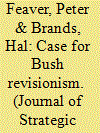

|
|
|
|
|
| Summary/Abstract |
This article reassesses the foreign policy legacy of George W. Bush in light of the emerging historical record of his administration. We conclude that, whereas Bush’s foreign policy was in widespread disrepute when he left office in 2009, that reputation is likely to improve – perhaps significantly – in the coming years. We identify six particular arguments that lend credence to an emerging ‘Bush revisionism.’ To be clear, we do not necessarily argue that the balance sheet on Bush’s foreign policy was positive, but the arguments presented here are likely to generate a more sympathetic and favorable historical assessment of Bush’s presidency over time.
|
|
|
|
|
|
|
|
|
|
|
|
|
|
|
|
| 2 |
ID:
158003


|
|
|
|
|
| Summary/Abstract |
The recent Russian approach to strategy has linked nuclear, conventional and informational (cyber) tools of influence into one integrated mechanism. The article traces the intellectual history of this Russian cross-domain concept, discusses its essence and highlights its destabilising effects. By analysing a case outside of Western strategic thought, it demonstrates how strategic concepts evolve differently in various cultural realms and argues for a tailored approach for exploring coercion policies of different actors. The findings of the study are applicable beyond the Russian case, and relevant to scholars and actors exploring, utilising or responding to cross-domain coercion strategy.
|
|
|
|
|
|
|
|
|
|
|
|
|
|
|
|
| 3 |
ID:
158004
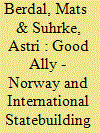

|
|
|
|
|
| Summary/Abstract |
The article examines the findings of the Commission of Inquiry established by the Norwegian government in 2014 to evaluate all aspects of Norway’s civilian and military contribution to the international operation in Afghanistan from 2001 to 2014. Concerned with the wider implications of the Commission’s findings, it focuses on two issues in particular: (1) Norway’s relations with the US, a close and long-standing strategic ally whose resources, capabilities and dominance of decision-making dwarfed that of all other coalition partners in Afghanistan; and (2) Norway’s record in the province of Faryab, where, from 2005 to 2012, a Norwegian-led Provincial Reconstruction Team was charged with bringing security, good governance and development to the province. How Norway prioritised and managed relations with the US highlights and helps to problematise the challenges – political, practical and moral – facing small and medium-sized powers operating in a coalition alongside the US. Norwegian efforts in Faryab are revealing of the dilemmas and contradictions that plagued and, ultimately, fatally undermined the international intervention as a whole. As such, Norway’s experience provides a microcosm through which the inherent limitations of the attempt to transfer the structures of modern statehood and Western democracy to Afghanistan can be better understood.
|
|
|
|
|
|
|
|
|
|
|
|
|
|
|
|
| 4 |
ID:
158007
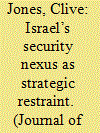

|
|
|
|
|
| Summary/Abstract |
This article examines the debates in Israel between 2009 and 2013 over Iran’s nuclear programme as a reflection of a particular type of civil–military or civil–security relationship. It analyses how key actors within that relationship – particularly those with an intelligence background – engaged with media outlets in Israel and further afield to influence domestic and international opinion over how best to contain Iran’s nuclear ambitions. In so doing, it seeks to address one fundamental question: are governments in Jerusalem any longer the final arbiters over deciding what is in the national security interests of the State of Israel?
|
|
|
|
|
|
|
|
|
|
|
|
|
|
|
|
| 5 |
ID:
158011
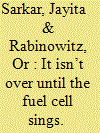

|
|
|
|
|
| Summary/Abstract |
Based on newly declassified archival documents, the aim of this study is to contribute to an improved understanding of the evolution of the non-proliferation regime through an examination of US and French nuclear cooperation agreements in the latter half of the 1970s. The four pledges of nuclear assistance examined – US assistance to Egypt and Israel, and French assistance to Pakistan and South Korea – failed to materialise by the end of the decade. Why did that happen? What caused the four pledges to fail? We find that the 1974 Indian nuclear explosion and the emergence of opposing domestic factions on the nuclear front in the supplier states generated major changes in US and French nuclear export policies, and also contributed to the development of a collaborative partnership between the two competing nuclear exporters, on the other.
|
|
|
|
|
|
|
|
|
|
|
|
|
|
|
|
| 6 |
ID:
158012


|
|
|
|
|
| Summary/Abstract |
Harvard professor Samuel P. Huntington has frequently been considered a Vietnam War hawk. His observation that ‘forced-draft urbanization’ might help the United States win the war has come to define his engagement in contemporary strategic debates. This essay argues that both Huntington’s academic work and his private policy advice to the U.S. Government in fact urged a political settlement to the conflict. It argues that in spite of this, Huntington refused to break publicly with the U.S. policy because of his wider concern over what he saw as a crisis of authority in the U.S. foreign policy and governing institutions in the era.
|
|
|
|
|
|
|
|
|
|
|
|
|
|
|
|
| 7 |
ID:
158009
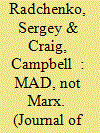

|
|
|
|
|
| Summary/Abstract |
The revival of nuclear strategy in US policy and scholarship has been strengthened by arguments that the ‘nuclear revolution’ – the assumption that thermonuclear bombs and missiles had made major war too dangerous to wage – does not affect international behaviour as much as nuclear revolution advocates claim. This article shows that the Soviet leader Nikita Khrushchev indeed regarded nuclear war as too dangerous to wage, a decision which manifested itself not so much in foreign policy or military doctrine but in his determination to avoid war when the possibility arose. We argue that Khrushchev’s experience provides us with a more useful way to characterise the nuclear revolution and suggest some implications of this argument for contemporary debates about nuclear weaponry.
|
|
|
|
|
|
|
|
|
|
|
|
|
|
|
|
| 8 |
ID:
158002
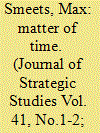

|
|
|
|
|
| Summary/Abstract |
This article examines the transitory nature of cyberweapons. Shedding light on this highly understudied facet is important both for grasping how cyberspace affects international security and policymakers’ efforts to make accurate decisions regarding the deployment of cyberweapons. First, laying out the life cycle of a cyberweapon, I argue that these offensive capabilities are both different in ‘degree’ and in ‘kind’ compared with other regarding their temporary ability to cause harm or damage. Second, I develop six propositions which indicate that not only technical features, inherent to the different types of cyber capabilities – that is, the type of exploited vulnerability, access and payload – but also offender and defender characteristics explain differences in transitoriness between cyberweapons. Finally, drawing out the implications, I reveal that the transitory nature of cyberweapons benefits great powers, changes the incentive structure for offensive cyber cooperation and induces a different funding structure for (military) cyber programs compared with conventional weapon programs. I also note that the time-dependent dynamic underlying cyberweapons potentially explains the limited deployment of cyberweapons compared to espionage capabilities.
|
|
|
|
|
|
|
|
|
|
|
|
|
|
|
|
| 9 |
ID:
158008


|
|
|
|
|
| Summary/Abstract |
Iran’s support for terrorist groups is the subject of countless articles and monographs. Less emphasis is placed on Tehran’s efforts to fight terrorist groups targeting the Iranian state. Yet, modern domestic and foreign terrorist groups have targeted Iran for decades. As a result, the country has developed fairly sophisticated, albeit opaque, counterterrorism apparatus and mechanisms. This article sheds light on the Iranian counterterrorism apparatus and efforts since the 1979 Islamic Revolution, drawing on several years of fieldwork in Iran, interviews with current and former officials, and Persian sources.
|
|
|
|
|
|
|
|
|
|
|
|
|
|
|
|
| 10 |
ID:
158006


|
|
|
|
|
| Summary/Abstract |
Targeted killings have become a central tactic in the United States' campaigns against militant and terrorist groups in the Middle East, Asia, and Africa. Both ‘demand’ and ‘supply’ factors explain the rise of targeted killings. Demand for targeted killings increased as the United States faced new threats from militant groups that could not be effectively countered with conventional military force. Concerns about the political consequences of long-term military involvement overseas and American casualties led political leaders to supply more targeted killings. The conclusion discusses how this tactic may have unintended consequences as other states follow the United States use of targeted killings.
|
|
|
|
|
|
|
|
|
|
|
|
|
|
|
|
| 11 |
ID:
158005
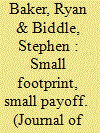

|
|
|
|
|
| Summary/Abstract |
After 15 years of war in Afghanistan and Iraq, many now see ‘small-footprint’ security force assistance (SFA) – training, advising and equipping allied militaries – as an alternative to large US ground-force commitments. Yet, its actual military efficacy has been little studied. This paper seeks to fill this gap. We find important limitations on SFA’s military utility, stemming from agency problems arising from systematic interest misalignment between the US and its typical partners. SFA’s achievable upper bound is modest and attainable only if US policy is intrusive and conditional, which it rarely is. For SFA, small footprints will usually mean small payoffs.
|
|
|
|
|
|
|
|
|
|
|
|
|
|
|
|
|
|
|
|
|